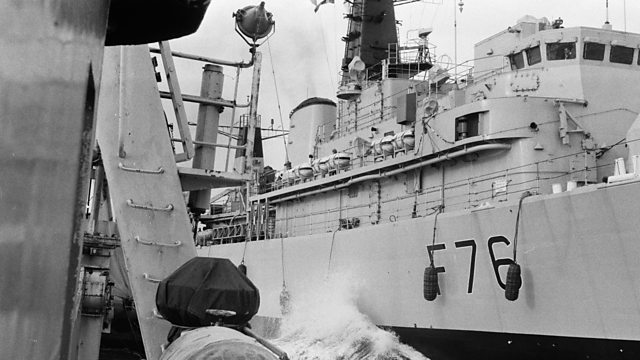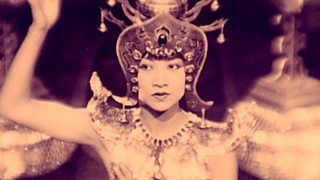
Cod Wars
This Icelandic film follows the bitter disputes between Iceland and Britain over fishing zones during the 1950s and 60s, which led to the three so-called Cod Wars.
It’s now 40 years since the end of the Cod Wars between Britain and Iceland. During the 1950s and 60s, Britain consumed 430,000 tons of cod each year, but as the stocks started to diminish the livelihoods of fishing communities in both countries were at stake. Iceland took steps to protect their fishing industry - the mainstay of their economy - resulting in the three so-called Cod Wars. This was a David and Goliath struggle, where the small fleet of Icelandic gunboats were pitted against the British trawlers and the Royal Navy in the North Atlantic.
This Icelandic film, made in 2001, tells the story from both sides and reflects on the impact of the Cod Wars in Grimsby and Hull.
Last on
Filmmakers Margret Jonasdottir and Magnus Vidar Sigurdsson answer the Storyville Q&A

The Cod Wars originally appealed to us because of the story itself. The history of the Cod Wars has been one of the greatest moments in modern history in Iceland where Icelanders had been able to stand their grounds and secure the fishery rights.
We were thinking of the whole story more than the characters when we first started to look at it. We knew of each other and when the idea came up, Magnus was working on a film script that took place in the Cod Wars and Margret was doing a MA thesis at UCL in London based on oral interviews with the trawlermen in Hull and Grimsby with the focus on the social and economical decline after the last Cod War. This became the first documentary we did together – with many to follow.
Why did the story interest you?
This was a very personal approach for Magnus Vidar, because his father was at the time a retired Coast Guard Commander. So Magnus was brought up right in the middle of the Cod Wars. Margret got more and more involved with the lives of the fishermen of Hull and Grimsby as she dug deeper into their personal stories. The lives changed drastically in the fishing ports and that story had never been really told in Iceland. The focus was always on Iceland but the consequences in the UK were not talked about. We were looking for an Icelandic story that could travel and we thought this was the one to start with.
How long did the process take?
It took us about 1.5 years to finance the film, but we did a three part series for Iceland first. We had pitched the story at IDFA in 1999 and the archives and the way were working with the story seemed to appeal to Nick Fraser who was there. He suggested we contact him, which we did.Β We then finished our three part series and were then commissioned to do a 70 min. version for the Βι¶ΉΤΌΕΔ.
Were there any surprises?
Our angle of the film was to tell the story first and foremost from the fishermen point of view, from the Coast Guard Commanders point of view, and the HMS Royal Navy Commanders viewpoints. Our main aim was to tell the story from the perspective of the ones that were at sea. The political story was the underlying story, but our biggest interest was what happened at sea.
Our biggest surprise was also how the British government had dealt with the issues of Hull and Grimsby after the decline of the industry after the last Cod War in 1976 – To our surprise promises of redundancy payments had not been met, and their endless fight for redundancy had not paid off. Not until after we finished the film, did they get petty payments for their loss of jobs. We as Icelanders had not realized that and that was our biggest surprise. To see the pride they had in the industry and the effects it had on them being laid off on unemployment benefits.
Person you most like to interview?
The person we most wanted to interview for this film was Henry Kissinger. He said in his autobiography that the Cod Wars were a typical example of how a small nation could bully a big one and that was a point we really wanted to make. We tried to get a hold of him, but he was not available during our filming period to do the interview but sent a very polite reply to us.
Best piece of filmmaking advice?
Always think of sound quality in everything you do. It is just as important as the filming itself. Sound and film need the same weight if you want to make a good film.
Best piece of equipment?
Because the sound is so important, a good microphone is the one I one can’t live without whilst filming.
What is your dream documentary subject?
The live of a whale and the birth of a whale is the subject director Magnus Vidar Sigurdsson would like to film.
Favorite film of all time?
The Godfather.
Most difficult access?
That was during this film, the access to the HMS Commanders and we were so lucky that the 25 year code of silence had just been lifted on the ambassadors that we needed to interview for this film. Also the access to the politicians was quite difficult to clear. Even so we managed to film Ted Heath in a legendary interview that gave us 12 minutes to as him about his involvement. The director acting as a make-up artist powdered him wrapped in a tea towel as he bluntly told us he had never experienced that before.
Favourite book?
Magnus has just read Into thin air, after having been in the production team of Everest. Margret is reading Robert M. Pirsig's Zen and the Art of Motorcycle Maintenance…
Broadcasts
 Mon 28 May 2001 22:30Βι¶ΉΤΌΕΔ Knowledge
Mon 28 May 2001 22:30Βι¶ΉΤΌΕΔ Knowledge Wed 27 Feb 2002 20:50Βι¶ΉΤΌΕΔ Knowledge
Wed 27 Feb 2002 20:50Βι¶ΉΤΌΕΔ Knowledge- Wed 7 Aug 2002 23:20
- Fri 2 Sep 2005 23:00
- Sun 2 Apr 2006 00:05
- Sun 9 May 2010 22:50
Featured in...
![]()
Documentary Films
Showcasing the very best in fascinating feature length documentaries.

